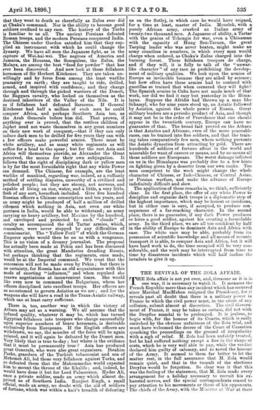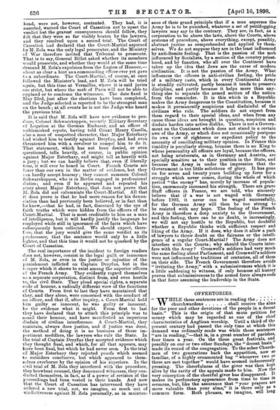THE REVIVAL OF THE ZOLA AFFAIR.
THE Zola affair is not yet over, and, tiresome as it is in one way, it is necessary to watch it. It menaces the French Republic more than any incident which has occurred since Marshal MacMahon resigned the Presidency, for it reveals past all doubt that there is a military power in France to which the civil power must, in the event of any collision, submit almost at discretion. The civil Govern- ment of France, it may be taken as certain, did not wish the Dreyfus scandal to be prolonged. It is jealous, to begin with, for the honour of its Courts, which is sadly smirched by the obvious unfairness of the Zola trial, and must have welcomed the decree of the Court of Cassation quashing the proceedings on the ground of irregularity with a sigh of relief. M. Zola had been unfairly treated, but he had suffered nothing except a fine in the shape of costs, which he is very well able to pay, while the verdict declared him guilty of calumny, and so saved the honour of the Army. It seemed to them far better to let the matter rest, in the full assurance that M. Zola would remain quiet, and that in the tumult of the elections Dreyfus would be forgotten. So clear was it that this was the feeling of the statesmen, that M. Zola made every arrangement for a holiday necessary to recruit his ex- hausted nerves, and the special correspondents ceased to pay attention to his movements or those of his opponents. The chiefs of the Army, with the Minister at War at their head, were not, however, contented. They had, it is asserted, warned the Court of Caseation not to upset the verdict lest the gravest consequences should follow, they felt that they were so far visibly beaten by the lawyers, and they resolved upon a second trial. The Court of Cassation had declared that the Court-Martial aspersed by M. Zola was the only legal prosecutor, and the Ministry of War therefore invited that Tribunal to prosecute. That is to say, General Billot asked whether its members would prosecute, and whether they would at the same time demand M. Zola's expulsion from the Legion of Honour,— about as clear a hint as a commanding officer ever yet gave t o a subordinate. The Court-Martial, of course, at once followed the Minister's lead, and M. Zola will be tried again, but this time at Versailles, where it is said juries are strict, but where the mob of Paris will not be able to applaud or to condemn the witnesses. The date fixed is May 23rd, just after the elections have been completed, and the Judge selected is reported to be the strongest man on the bench ; at all events he is not the Judge who heard the previous trial.
It is said that M. Zola will have new evidence to pro- duce, Colonel Schwarzkoppen, recently Military Secretary of Legation at the German Embassy, and an officer of unblemished repute, having told Count Henry Casella, also a man of unspotted character, that Major Esterhazy Lad wished him to testify against Dreyfus, and had even threatened him with a revolver to compel him to do it. That statement, which has not been denied, or even questioned, tells heavily, of course, in public opinion against Major Esterhazy, and might tell as heavily with a jury ; but we can hardly believe that, even if literally true, it will ever be heard in Court. French Courts are Lixer than our own in the matter of evidence, but they can hardly accept hearsay ; they cannot summon Colonel Schwarzkoppen, who is in Berlin engaged in professional duties ; and even if he appeared and repeated his story about Major Esterhazy, that does not prove that M. Zola did not calumniate the Court-Martial. All that it does prove is that he had more reason for his denun- ciation than had previously been believed, or in fact than he knew,—that he had, in fact, discerned by the eye of faith truths which were hidden from the officers of the Court-Martial. That is most creditable to him as a man of intelligence, but it will hardly justify the language he employed while still in ignorance of the facts which have subsequently been collected. We should expect, there- f )re, that the jury would give the same verdict as its predecessor, that the sentence would only be a little lighter, and that this time it would not be quashed by the Court of Caseation.
The real importance of the incident to foreign readers does not, however, consist in the legal guilt or innocence of M. Zola, or even in the justice or injustice of the punishment inflicted on Captain Dreyfus, but in the temper which it shows to exist among the superior officers of the French Army. They evidently regard themselves as a separate corporation, distinct from, and even hostile to, the civil State. They plead special rights, a separate code of honour, a radically different view of the functions of Courts. From first to last they have maintained that they, and they alone, were concerned with the conduct of au officer, and that if, after inquiry, a Court-Martial held him guilty or innocent, he was guilty or innocent, be the evidence what it might. From first to last they have declared that to attack this principle was to assail their honour, and have manifested an imperious disdain of civilian interference. A Court-Martial, they maintain, always does justice, and if justice was done, the method of doing it is no business of those im- pertinent meddlers, the lawyers who rule the State. In the trial of Captain Dreyfus they accepted evidence which they thought final, and which, for all that appears, may have been final, but which he had never seen. In the trial of Major Esterhazy they rejected proofs which seemed to outsiders conclusive, but which appeared to them- selves overborne by the opinion of his superiors. In the civil trial of M. Zola they interfered with the procedure, they browbeat counsel, they denounced witnesses, they con- ducted themselves, in fact, as if a power of revision of the proceedings had been vested in their hands. And now that the Court of Cassation has intervened they have ordered a new trial, not, we imagine, so much out of vindictiveness against M. Zola personally, as in mainten- ance of their grand principle that if a man asperses the Army he is to be punished, whatever a set of pettifogging lawyers may say to the contrary. They are, in fact, as a corporation to be above the laws, above the Courts, above systems of procedure, above everything, except, possibly, abstract justice as comprehended and applied by them- selves. We do not suppose they are in the least influenced by anti-Semite feeling: That is the passion of the mob influenced by Socialists, by a section of the country priest- hood, and by fanatics, who all over the Continent have taken up the idea that Jews are the curse of modern civilisation. It is not the passion of the Army. What influences the officers is anti-civilian feeling, the pride of a military caste, which in every Continental Army is steadily cultivated, partly because it tends to preserve discipline, and partly because it helps more than any- thing else to separate the armed section of the nation from the remainder. It is this which in a Republic makes the Army dangerous to the Constitution, because it makes it permanently suspicious and disdainful of the civilians who rule. The soldiers do not expect from them regard to their special ideas, and when from any cause those ideas are brought in question, suspicion and disdain harden into active dislike. There is not a Govern- ment on the Continent which does not stand in a certain awe of the Army, or which does not occasionally postpone its own view of righteous or expedient policy to the necessity of conciliating military opinion. In France this timidity is peculiarly strong, because there is no King to whose personality all officers are loyal, because the officers, not being aristocrats, as in Germany and Austria, are specially sensitive as to their position in the State, and because the Army is under the impression that the Government is too little solicitous of glory. It has gone on for seven and twenty years building up force for a struggle which never comes, during the whole of which period "the enemy" has, merely by increase of popula- tion, enormously increased his strength. There are grave Staff officers in France, we are told, who sincerely believe that if a war is not waged with Germany before 1903, it never can be waged successfully, for the German Army will then be too strong to be resisted with any hope. The feeling of the French Army is therefore a deep anxiety to the Government, and this feeling, there can be no doubt, is increasingly, we will not say hostile to the Republic, but doubtful whether a Republic thinks with sufficient respect and liking of the Army. If it does, why does it allow a pack of lawyers to throw doubt on the fairness or the intelli- gence of a regular Court-Martial? The Army does not interfere with the Courts ; why should the Courts inter- fere with the Army ? Cromwell's soldiers had very much the same feeling about Parliament, and Cromwell's soldiers were not influenced by traditions of centuries, all of them on their side. The French Government therefore avoids " irritating the Army," with a submissiveness which it is a little saddening to witness, if only because all history proves that submissiveness to the armed force always ends in that force assuming the leadership in the State.



































 Previous page
Previous page